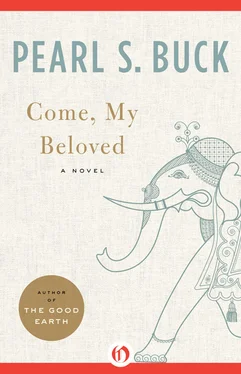The cross streets were narrow even for the gherry, but the driver, muttering something over his shoulder, drove the bullock toward a row of shops, jewelers and dealers in precious stones, and then as though this were the ultimate destination, he stopped and motioned that they were to descend.
“Well,” MacArd said with a faint smile all but lost in his beard, “he seems to know what he wants us to do.”
“We may as well obey,” David replied.
They got out and the driver tucked his head into his dirty cotton robe and prepared to sleep.
The shops, or bazaars, whatever one chose to call them, were crowded with people examining jewels and ornaments, arguing and exclaiming and comparing. A few women turned their backs as they saw the white men but the beggars swarmed around them. Jewels were in rich display, rubies and pink Indian pearls, amethysts and diamonds, turquoise and Chinese jade set in elaborate gold, decorations for women’s necks and wrists and ankles, or to set in the turban of a man. Seeing the Americans, the shopkeepers called to them from every side. MacArd hesitated, struck suddenly by a pang at the heart. There was no one now for whom he cared to buy jewels. Had Leila been with him, as once they had planned she would be, for she had a curiosity about the East, and especially India, fostered, perhaps, by missionaries who came to her church, why then he would have delighted to buy for her the necklace of pearls, the emeralds set in a heavy bracelet of yellow gold. Indian emeralds were the most beautiful in the world, and how well her dark hair and eyes would have set off that vivid green, and how dearly he would have enjoyed her wearing them at home, sitting at the far end of his vast table. He would have boasted to his guests, “Yes, we bought Leila’s emeralds in India, in the Street of Jewels. There are thousands of shops, six thousand, they told us, and we thought these the finest gems we saw.”
Leila was dead. That he must repeat to himself. He looked at David, standing quietly beside him, gazing not at the jewels but at the people.
“Shall we go?” he asked.
“Whenever you say,” David replied.
They climbed back into the vehicle to the disappointment of jewelers and beggars alike, and prodding the driver awake with his cane, MacArd pointed him back again to the English city, to the wide streets, the great houses of green and grey stone. There MacArd dismissed the wretched conveyance and they got into the horsedrawn streetcar for Malabar Point.
“An American named Kittredge built this streetcar system,” he informed his son, making conversation again.
“Did he?” David murmured.
They were passing the Cathedral and near it stood the statue of Lord Cornwallis, the Governor-General of India after England lost the American colonies, a statue raised, the guidebook said, by funds from the merchants of Bombay.
“Cornwallis,” MacArd said briefly, nodding at the haughty figure.
David looked and did not reply.
North of the bay stood the Towers of Silence. They had been told at the hotel that surely they must see the Towers. “A very interesting sight,” the clerk had informed them with condescension.
“Are you tired?” MacArd asked in sudden anxiety. His son’s cheeks were pale.
“I feel odd,” David said with some effort. “I feel smothered. It’s only the heat, I think.”
“We’ll get off and go back to the hotel,” MacArd said firmly. Again they descended, and catching a car returning from Malabar Point, they were within the half hour back in their rooms. Wahdi, asleep at the door, leaped to his feet. MacArd ignored him.
“You are not ill?” he insisted, gazing anxiously at his son.
“Oh no,” David protested. “Perhaps, again, it’s the ship. I seem to feel the sea still rising and falling. I will lie down.”
“I fetch you tea, Sahib.” Wahdi, hovering about them, increased the oppression of the atmosphere.
“Fetch it then,” MacArd commanded. “And David, take a cool sponge. It will refresh you.”
“Thanks, Father,” David said. “Don’t bother. I’ll drink the tea and be better.”
He longed to shut the door between the rooms but he did not wish to wound his father. He had never before been alone with his father for days and weeks. There had always been his mother between them, and now she was no more. He must learn to live without feeling oppressed by this powerful personality. He smiled at his father and then taking courage he shut the door between them.
In his bathroom MacArd poured water over himself in the fashion that the guidebook had suggested to them. He stood on the sloping stone floor and with the metal dipper he dipped up water from a large porcelain jar and poured it over his head and shoulders. It was refreshing, he had to admit, feeling the rills of water running down his white body, the dead white of the red-haired, so much less beautiful than Leila’s lovely cream color. That abundant joy was his no more. He strove to be stern with himself, to repress the vitality of his vigorous frame. He must shape all his time now to other ends, undertake new work, busy himself — but with what? While she lived, his life was full every hour of the day and night, and now, suddenly it all had come to an end and so quickly that still he could scarcely believe it. Her heart, which none had suspected, had in the night, a night like any other, simply ceased to beat, without reason, without will, a mystery except that in her pretty, wilful way she never went to doctors. Not since David’s birth and the painful operation after it, which had made it evident that there would be no more children, never after those weeks in the hospital had she been willing to have a doctor. She treated herself in secret ways and he knew it only because he found bottles of medicine sometimes on her table. Then, terrified, he demanded to know if she suffered pain or felt ill and she never would tell him. She had laughed at him and had showed him her lovely round arms and had bade him look at the color of her cheeks.
“Do I look like an invalid?” she had demanded.
What could he say but the truth that she looked like health itself? Afterwards the bright eyes and the quick vivid color were, the doctor said, the very signs of death.
MacArd gave a groaning sigh as he remembered, and then wrapping his linen bathrobe about him, he sat down in a deep wicker chair in his bedroom. Immediately the weight of his loneliness, his distance from home, the knowledge that even though he returned to his house it would be empty for him, overcame him, and he closed his eyes and leaned back his head. He had not for years really prayed to God, although it was his nightly habit, because it had been Leila’s, to kneel at his bedside for a few minutes. Sometimes he had prayed during those minutes, but usually it had been sheer pretense, the wish not to hurt his wife, who had the habit of devoutness natural to her generation and his. Since her death he had put aside pretense, but suddenly now here in this distant room in India, prayer burst articulate from his frantic heart.
“Oh God, show me what to do with my life and my money that in the end I may rejoin my beloved wife in heaven!”
He did not doubt for one moment that Leila was in heaven, if there were such a place, for she had been a tender woman of such goodness and purity that she had already been an angel on earth. That she was ever petty or that she had ever made him impatient seemed impossible to him, and he thought now of such moments as entirely his own fault, although he had not always recognized it so when she was alive. She had sometimes complained against him because, she said, he was only interested in making money. It was true. His life had been absorbed in establishing the vast network of his interests. He had founded his fortune in railroads, and he was still the president of that, his oldest corporation, but railroads, as half a dozen men in his country knew, were merely arteries for trade, and now, with the nineteenth century in its last decade, the young and hungry country in which he had grown up yearned for more railroads and more trade. To pursue his golden way had been his business, but it had been his excitement and achievement, too. It had been fun as well as glory, and he did not care how much of his money Leila gave away. He liked to see his wife’s name heading a charity, “Mrs. David Hardworth MacArd, five thousand dollars.”
Читать дальше












